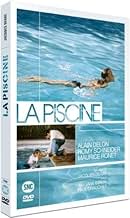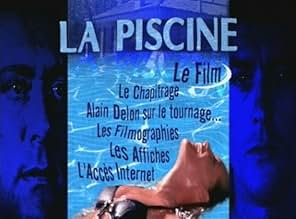AVALIAÇÃO DA IMDb
7,1/10
14 mil
SUA AVALIAÇÃO
Os amantes Marianne e Jean-Paul passam as férias em uma vila na Riviera francesa, perto de Saint-Tropez. Marianne convida seu ex-amante, Harry, e sua filha adolescente a ficar. A tensão aume... Ler tudoOs amantes Marianne e Jean-Paul passam as férias em uma vila na Riviera francesa, perto de Saint-Tropez. Marianne convida seu ex-amante, Harry, e sua filha adolescente a ficar. A tensão aumenta quando Jean-Paul seduz Penélope.Os amantes Marianne e Jean-Paul passam as férias em uma vila na Riviera francesa, perto de Saint-Tropez. Marianne convida seu ex-amante, Harry, e sua filha adolescente a ficar. A tensão aumenta quando Jean-Paul seduz Penélope.
Maddly Bamy
- La mulâtre qui danse
- (as Madlybamy)
Steve Eckardt
- Fred
- (as Steve Eckart)
Stéphanie Fugain
- Une amie à la party
- (não creditado)
- Direção
- Roteiristas
- Elenco e equipe completos
- Produção, bilheteria e muito mais no IMDbPro
Alain Delon's Top 10 Films, Ranked
Alain Delon's Top 10 Films, Ranked
To celebrate the life and career of Alain Delon, the actor often credited with starring in some of the greatest European films of the 1960s and '70s, we rounded up his top 10 movies, ranked by IMDb fan ratings.
Enredo
Você sabia?
- CuriosidadesThe film reunited a 1960's "mythical couple' Alain Delon and Romy Schneider. Schneider had dramatically broken-up with Delon couple years earlier and married German director and actor Harry Meyen in Berlin. She had a child. Delon insisted on her being cast, threatening to quite the film if she wasn't, despite producer Gérard Beytout's misgivings, as he was dubious about the actress from the Sissi (1955) trilogy in a bikini. Delon continuously pursued her, both before and after filming, with persistent attempts to reconcile. Despite Schneider's refusals, their shared history and emotional connection spilled onto the screen, infusing the film with raw authenticity. This genuine emotional backdrop, rooted in their real-life relationship, transcended the film's narrative, elevating it beyond its initial reception. While the original film may not have garnered universal acclaim, its enduring appeal lies in the palpable chemistry and complex emotions brought by Delon and Schneider.
- Erros de gravaçãoA body of someone that has just drowned does not float on water. Only after the decaying process has started and gases build up in the body does the body float to the surface.
- Cenas durante ou pós-créditosThe opening credits shimmer, as though they were being projected onto the surface of the swimming pool.
- Versões alternativasEnglish version. As all the cast, except Paul Crauchet, were fluent in English the scenes were shot both in French and in English. This version proves to be funny for the English-by-the-book used in the dialogue (obviously a line by line rendition of the original French script). The English version is also about ten minutes shorter with slightly different edit and has a few other differences (such as Romy Schneider wearing a bikini top in the English version in scenes where she is topless in the French version).
- ConexõesFeatured in La vengeance du serpent à plumes (1984)
Avaliação em destaque
La piscine or The Swimming Pool is a French crime film, directed by Jacques Deray, who is known as a master of crime, and written by Jean-Claude Carriere; a long time companion of Luis Bunuel, for instance. La piscine isn't necessarily the most accessible French crime film but I would say it is one of the best, at least from the 1960's. It is an erotic, Antonionian film characterized by French existentialism. Although, it is not a perfect film, by any means, it is a surprisingly captivating and intriguing study on modern life as well as on alienation from the world and the society; loneliness, anxiety, love and freedom. The absurdity of being and the meaninglessness of life, how, in the end, nothing really matters.
The story happens somewhere in the French Riviera, where a couple is spending their holiday at a luxury château, borrowed from their friends. During the opening credits, we see reflections of nature on water: images of birds and trees. After the credits, the camera rises up and the water surface turns out to be a swimming pool, next to which there lies a man -- an insightful shot of the vacant and anguished life of the bourgeoisie. Everything was a lie; beauty and the happiness of life were only elusive reflections -- which happens to be the leading theme of Deray's film.
Soon we hear a woman shouting "Jean-Paul," and the man turns out to be Alain Delon. The woman (Romy Schneider) swims across the pool, comes to the man and they start kissing, fiercely. The physic happiness of this married couple is almost perfect. But details reveal pressures that begin to erupt, slowly, beneath the surface. In order to resist this anxiety, they make up the most shallow things for them to do and, therefore, invite a friend of theirs, Harry who surprisingly brings his 18-year-old daughter (Jane Birkin) with him. At a surprise party -- that resembles the party of The Night (1961) by Michelangelo Antonioni -- the pressures lead to tragic consequences.
La piscine strips seemingly beautiful and happy people down from their illusory facade. Jean-Paul turns out to be a failed writer whose fragile ego hides mysterious cruelty in it. On one level, he resembles Camus' Mersault as an apathetic and disregard man who has lost his lust for life. His wife, Marianne (Schneider) is, in turn, a prisoner of her emotions and is unable to free herself from the chains of her husband. Harry is good-looking and wealthy but, in reality, all of his relationships are elusive and mendacious. Nobody cares about him. His daughter, Penelope (Birkin) is a beautiful young woman who arises to her femininity but finds it hard to compete with Marianne.
Jacques Deray relays a competitive, jail-like vision of the lives of these characters. We see them behind bars, pillars and windows; trapped in an unending rat race. They are captivated like wild beasts, who are ready to kill each other at any second. Furthermore, all the characters are spying on each other: Jean-Paul keeps an eye on Marianne and Harry, for he thinks that they might have an affair. Harry, on the other hand, spies on Jean-Paul and Penelope because his juvenile father instincts can't bear a contestant. Marianne is also spying on them, because she thinks that she might lose the competition of Jean-Paul to a younger woman.
In the name of existentialist film, La piscine begins from nowhere and ends in somewhere which is quite the same. So why watch a film where nothing happens? Because, on the other hand, everything happens. Why read Kafka and watch Tarkovsky? For the very same reason. Although, La piscine is not a masterpiece, I would recommend it as an insightful film about loneliness and the illusion of idyllic life.
The story happens somewhere in the French Riviera, where a couple is spending their holiday at a luxury château, borrowed from their friends. During the opening credits, we see reflections of nature on water: images of birds and trees. After the credits, the camera rises up and the water surface turns out to be a swimming pool, next to which there lies a man -- an insightful shot of the vacant and anguished life of the bourgeoisie. Everything was a lie; beauty and the happiness of life were only elusive reflections -- which happens to be the leading theme of Deray's film.
Soon we hear a woman shouting "Jean-Paul," and the man turns out to be Alain Delon. The woman (Romy Schneider) swims across the pool, comes to the man and they start kissing, fiercely. The physic happiness of this married couple is almost perfect. But details reveal pressures that begin to erupt, slowly, beneath the surface. In order to resist this anxiety, they make up the most shallow things for them to do and, therefore, invite a friend of theirs, Harry who surprisingly brings his 18-year-old daughter (Jane Birkin) with him. At a surprise party -- that resembles the party of The Night (1961) by Michelangelo Antonioni -- the pressures lead to tragic consequences.
La piscine strips seemingly beautiful and happy people down from their illusory facade. Jean-Paul turns out to be a failed writer whose fragile ego hides mysterious cruelty in it. On one level, he resembles Camus' Mersault as an apathetic and disregard man who has lost his lust for life. His wife, Marianne (Schneider) is, in turn, a prisoner of her emotions and is unable to free herself from the chains of her husband. Harry is good-looking and wealthy but, in reality, all of his relationships are elusive and mendacious. Nobody cares about him. His daughter, Penelope (Birkin) is a beautiful young woman who arises to her femininity but finds it hard to compete with Marianne.
Jacques Deray relays a competitive, jail-like vision of the lives of these characters. We see them behind bars, pillars and windows; trapped in an unending rat race. They are captivated like wild beasts, who are ready to kill each other at any second. Furthermore, all the characters are spying on each other: Jean-Paul keeps an eye on Marianne and Harry, for he thinks that they might have an affair. Harry, on the other hand, spies on Jean-Paul and Penelope because his juvenile father instincts can't bear a contestant. Marianne is also spying on them, because she thinks that she might lose the competition of Jean-Paul to a younger woman.
In the name of existentialist film, La piscine begins from nowhere and ends in somewhere which is quite the same. So why watch a film where nothing happens? Because, on the other hand, everything happens. Why read Kafka and watch Tarkovsky? For the very same reason. Although, La piscine is not a masterpiece, I would recommend it as an insightful film about loneliness and the illusion of idyllic life.
- ilpohirvonen
- 20 de out. de 2011
- Link permanente
Principais escolhas
Faça login para avaliar e ver a lista de recomendações personalizadas
- How long is The Swimming Pool?Fornecido pela Alexa
Detalhes
- Data de lançamento
- Países de origem
- Central de atendimento oficial
- Idiomas
- Também conhecido como
- La piscina
- Locações de filme
- Ramatuelle, Var, França(villa and swiming pool at L'Oumède)
- Empresas de produção
- Consulte mais créditos da empresa na IMDbPro
Bilheteria
- Faturamento bruto nos EUA e Canadá
- US$ 211.467
- Fim de semana de estreia nos EUA e Canadá
- US$ 3.867
- 16 de mai. de 2021
- Faturamento bruto mundial
- US$ 217.029
- Tempo de duração2 horas 2 minutos
- Mixagem de som
- Proporção
- 1.66 : 1
Contribua para esta página
Sugerir uma alteração ou adicionar conteúdo ausente


![Assistir a Bande-annonce [OV]](https://m.media-amazon.com/images/M/MV5BNzFiYWQzZjAtYjQ2Ni00ZWIzLTk4OTctNzg0NTNiMjc2ZjlkXkEyXkFqcGdeQXRyYW5zY29kZS13b3JrZmxvdw@@._V1_QL75_UX500_CR0)



























